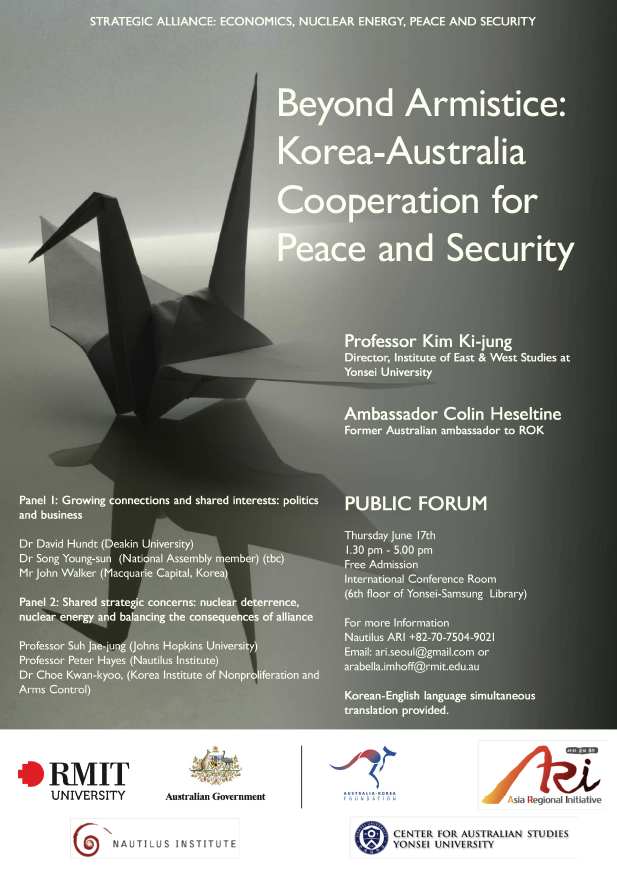In June 2010, Nautilus Institute ran a research workshop and a public forum in Seoul on Australia-Korea strategic futures and strengthened civil society policy relations. Nautilus Institute would like to thank the Australia-Korea Foundation for their support for this project.
The research forum, Strong connections: Australia-Korea strategic futures and strengthened civil society policy connections, explored government and civil society perspectives on the enduring consequences of the Korean War, and developing new approaches to shared strategic problems such as extended nuclear deterrence at a time when the abolition of nuclear weapons is firmly on the global agenda. Papers from the workshop will be available after the workshop on Nautilus Institute websites. Draft papers (not for citation) are available here.
The public forum, titled Beyond Armistice: Korea-Australia Cooperation for Peace and Security was hosted by the Center for Australian Studies at Yonsei University, and took place at the International Conference Room, 6th floor, Yonsei Samsung Library, Yonsei University, from 1.30 – 5.00 pm, June 17th. The agenda is here.
Participants in the workshop and forum include:
Cheon Seong-whun (Korea Institute for National Unification)
Choe Kwan Kyu (Korea Institute for Nuclear Nonproliferation and Arms Control)
Stephan Fruhling (Australian National University)
Michael Hamel-Green (Victoria University)
Peter Hayes (Nautilus Institute)
Colin Heseltine (former Australian ambassador to ROK)
David Hundt (Deakin University)
Kim Euikon (Inha University)
Kim Ki-jung (Yonsei University)
Lee Ji-hyun (Nautilus ARI)Lee Heajeong (Joongang University)
Lee Taeho (People’s Solidarity for Participatory Democracy)
Jeffrey Lewis (New America Foundation)Moon Kyoung-hee (Changwon National University)
Patrick Morgan (University of California, Irvine)
Leon Sigal (Social Science Research Council, New York)
Song Young-sun (National Assembly)
Suh Jae-jung (Johns Hopkins University)
Richard Tanter (Nautilus Institute RMIT)
Mark Valencia (Nautilus Institute, Senior Research Associate)
John Walker AM, (Macquarie Group of Companies, Korea)
Yi Kiho (Nautilus ARI and Hanshin University)
Related work
This project draws upon three complementary areas of Nautilus Institute work.
- Civil Society in East Asia: Nautilus is building networks between civil society leaders in South Korea, Japan, and China to develop solutions to complex and interconnected global problems.
- Korea-Japan Nuclear Weapon Free Zone: A Korea-Japan Nuclear Weapon Free Zone could help resolve a number of linked and intractable security issues in Northeast Asia, including the need to respond to North Korea’s nuclear breakout, the need for Japan and Korea to deepen their non-nuclear commitments and the development of Korean-Japanese cooperation for long-term regional security.
Background information: Extended nuclear deterrence in the Republic of Korea.


